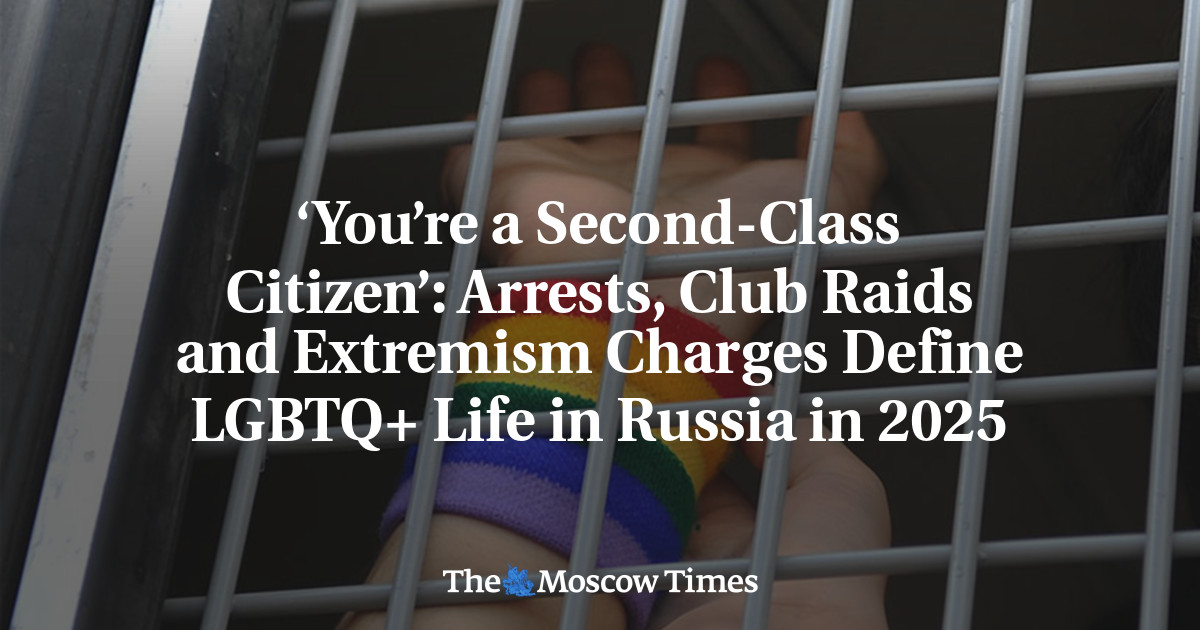
‘You’re a Second-Class Citizen’: Arrests, Club Raids and Extremism Charges Define LGBTQ+ Life in Russia in 2025
How did your country report this? Share your view in the comments.
Diverging Reports Breakdown
‘You’re a Second-Class Citizen’: Arrests, Club Raids and Extremism Charges Define LGBTQ+ Life in Russia in 2025
Russia’s Supreme Court declared the so-called “international LGBT movement” extremist 1.5 years ago. Under this sweeping designation, any public display of queerness can be interpreted as extremist. Since the extremist designation, Russian authorities have opened at least 12 criminal cases on charges related to LGBTQ+ activities. One of the most tragic cases in the wave of prosecutions for “LGBT extremism” is that of 48-year-old Andrei Kotov, whose death in a pre-trial detention center raised serious concerns about the pressure faced by those accused under the anti-LGBTQ+ laws. “I hide my orientation, but hiding has become part of me. I’m used to it,” said one gay man from Moscow, who spoke on condition of anonymity to The Moscow Times.. In recent weeks, at least three major publishing houses — Samat, Ripol and Eksmo — sent requests to booksellers to remove certain titles from shelves, demanding their return or destruction with written proof.
Another gay person said he feels that “there’s no place for people like me” in Russia. “I don’t feel safe — even going to a gay club could cost me my job or worse. Holding hands with a boyfriend could mean jail or death in jail. I have to force myself to adapt to a society that has no space for me,” he said, referring to widespread reports of abuse and harassment against LGBTQ+ people in Russian prisons. In 2024, Russian courts handed down 146 fines for so-called “gay propaganda,” an offense first introduced in a 2013 law that has been expanded over the years. Since the extremist designation, Russian authorities have opened at least 12 criminal cases on charges related to LGBTQ+ activities, according to the independent rights watchdog OVD-Info. These charges are punishable by up to 12 years in prison. One of the most tragic cases in the wave of prosecutions for “LGBT extremism” is that of 48-year-old Andrei Kotov, whose death in a pre-trial detention center raised serious concerns about the pressure faced by those accused under the anti-LGBTQ+ laws. Kotov was arrested in Moscow in late December 2024 on charges of creating an extremist organization related to his alleged organization of “gay tours.” Authorities added him to the federal terrorists and extremists registry, allowing authorities to freeze their bank accounts without a court order. Before his death, Kotov said he had been beaten and tortured with an electric shocker in detention. His lawyer told the BBC’s Russian service that Kotov “had no idea” his work could be considered extremism and that “he never managed to understand what exactly he was being accused of.” Another activity that could lead to jail could be going to a nightclub or organizing a party.
Jiroe (Matia Rengel) / unsplash
The first criminal case for “organizing an extremist community” due to alleged LGBTQ+ affiliation was launched in March 2024. Vyacheslav Khasanov, the owner of the Pose nightclub in the city of Orenburg, was arrested along with staff members Alexander Klimov and Diana Kamilyanova. All three were also added to the federal registry of terrorists and extremists. In total, over 50 clubs allegedly associated with LGBTQ+ people or holding such events have been raided over the past year and a half under the pretext of fighting “LGBT propaganda,” said a joint calculation by Current Time and the Sfera Foundation, which helps LGBTQ+ people in Russia. Literature has also come under scrutiny. In recent weeks, at least three major publishing houses — Samokat, Ripol and Eksmo — sent requests to booksellers to remove certain titles deemed to contain LGBTQ+ content from shelves, demanding either their return or destruction with written proof of disposal. Last month, authorities arrested three employees of the independent publisher Individuum, accusing them of publishing literature with LGBTQ+ themes and charging them with organizing an extremist organization’s activities. State repression has significantly worsened public attitudes toward LGBTQ+ individuals in families, schools, universities and workplaces, said Yan Dvorkin, the head of Center-T, an organization that supports transgender and non-binary people in Russia. “People who were previously just transphobic or homophobic now feel empowered — to intimidate, blackmail and threaten others with administrative or even criminal prosecution,” Dvorkin told The Moscow Times.
